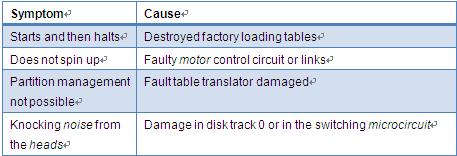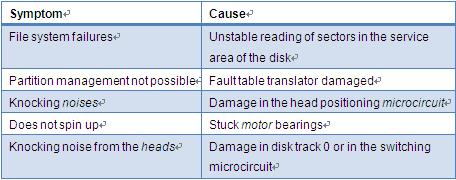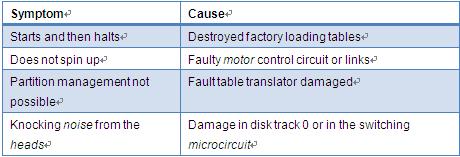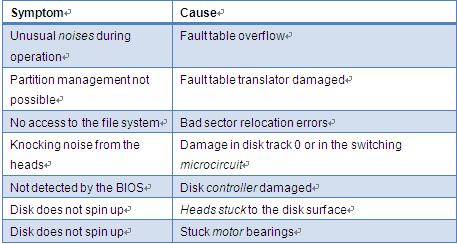Seagate are presently among the most popular and reliable hard disks drives. The disks of the Barracuda ATA 4, ATA 5 and SATA series are relatively fast and advanced models, the only major drawback of which is their considerable heating during operation. Most frequently repairs are called for because of damaged controller components or stuck spindle motors. Disks from the U series also suffer from reading problems due to erratic development of unstable regions on the disk surface which are impossible to eliminate in any conventional way. Data recovery from Seagate HDD’s is a labor consuming process, especially in cases of mechanical damage, and may take up a lot of time, but the chances of success are typically high.
Maxtor, former Quantum, are inexpensive and relatively fast disks, although with quite a few downsides. With time the motor noise increases, the disk tends to develop surface defects and detection failures by the system may occur with increasing frequency. It is not recommended to use these disks for storing critical information and regular backups are just obligatory. While in most cases repair works are attempted for the sole purpose of data recovery, the repaired disk itself can be operational for a long time, except for the slim models which usually fail again within several weeks. The owners of such disks are advised to consider replacement with a more reliable brand. Data from these disks can be recovered successfully, but the repair work must always be trusted to a specialized service shop.
Western Digital disks, although quite widespread in the past, have never been regarded as very reliable. Disks manufactured only three or four years ago are now rarely to be found in a good operating condition. Current models of WD have a satisfactory price/capacity ratio. The new models of WD are called in for repair not very often, maybe also due to their low popularity. A characteristic feature of these disks is the sudden appearance and quick development of bad sectors in different areas of the disk surface. In some cases the disk fails to be detected by the BIOS because of faults in the switching microcircuits. The specific design and circuitry of these disks can sometimes make the task of data recovery after a physical damage too complicated.

IBM (presently Hitachi) are fast and advanced hard disk drives, however not very reliable, especially the glass plate models (DTLA and AVER series). If during startup the disk is not detected or detection is slow, then repair time has certainly come. These disks are highly serviceable and, if treated properly, can continue to operate reliably for a long time. Exception are the cases when the disk repeatedly emits a strong squeaking noise, which is a sign of a serious physical damage of the magnetic surface. Data can still be recovered, but quite complicated situations are possible when the magnetic surface has begun to destroy, thus making the data recovery task more time consuming and problematical. Isolated batches (assembled in Hungary and Romania) with numerous identical defects have also been registered. The production of HDD’s by IBM was discontinued.

Hitachi is successor to the IBM HDD manufacturing division. Most of the remarks about IBM disks are valid for Hitachi as well.
Samsung hard disks are noteworthy for their combination of good performance, high reliability and attractive price. Current models (SP series) are hardly ever called in for repairs, unlike earlier models (Wiener series) most of which are already out of use. Samsung disks usually fail suddenly and for no obvious reason. With the IDE models service problems begin to appear after at least one or two years of operation. Data recovery is very difficult because of the specific design of these disks. Therefore, regular backups are strongly advised.

Fujitsu, while known in the past as expensive and extremely reliable, with the advent of the MPG series these disks now present a sorry sight. The disk begins to shut off during operation and periodically fails to be detected by the system. Next comes full inoperability of the disk. Hopes for spontaneous revival are illusory since these misfortunate events repeat again and again. Data recovery from a damaged disk is in most cases successful. The disk can be repaired, but it is impossible to guarantee its stable operation. Fujitsu is discontinuing the production of hard disks for personal computers.





